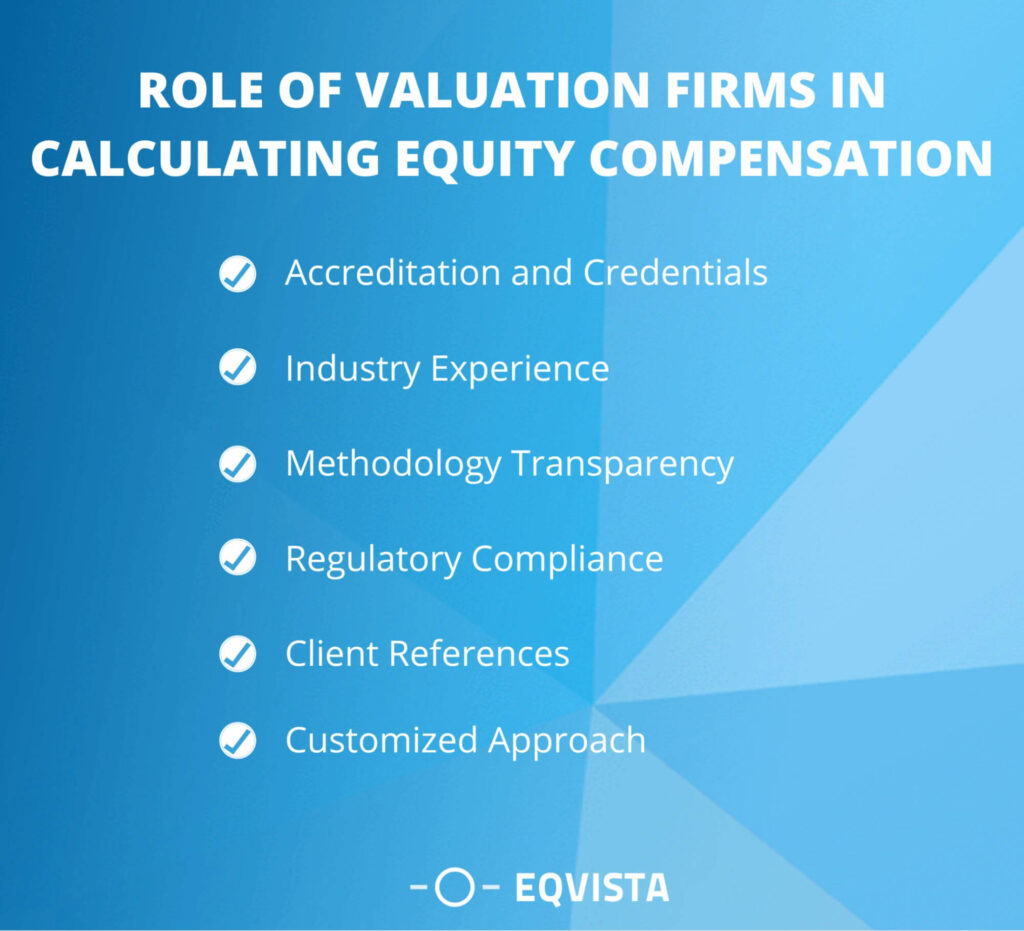409a valuation for equity compensation
This article will take you deep into the context of 409A and explaining how it operates.
A 409A valuation is usually necessary for any US-based firm that intends to provide stock to individuals, including founders and employees. You will require a 409A valuation if you issue equity to someone in the US, regardless of your company’s location.
Entrepreneurs and CEOs of startups are rapidly recognizing that 409A valuations conducted in the early stages using a hasty, unoriginal approach can lead to inflated option pricing and irate shareholders and staff.
This article will take you deep into the context of 409A, explaining how it operates, what it implies for employee stock options and RSUs, and how to complete it.
409a Valuation and Equity Compensation
Equity compensation has been a crucial component of incentive pay systems for many years. When an equity compensation plan involves a publicly listed corporation, share-based payment calculation is very simple because the stock’s current value is available. However, the enterprise value and related share-based remuneration can be somewhat complicated for private enterprises.
The Essence of 409A Valuation for Equity Compensation
The purpose of a 409a valuation is to ascertain the FMV of the common stock of a private corporation in accordance with the provisions of Internal Revenue Code section 409A. In essence, it establishes the price at which investors must purchase your company’s stock.
Nevertheless, the time and intent of the appraisal are what set it apart. If you want your stock option’s strike or exercise pricing to be at its fair market value (FMV), you must undertake a 409a valuation when you issue the option. If you don’t do this, you can be subject to tax fines and other repercussions, as outlined in Section 409A. You need the tax department to accept the prior strike price from the time of the grant.
Section 409A does not apply to RSUs because, unlike other forms of deferred compensation, they normally get paid out when they vest, not when awarded. Restricted stock units (RSUs) are future equity subject to specific circumstances (or triggers) before they vest.
Navigating the Complexity Of Equity Compensation
Equity compensation valuation in private enterprises is complex because of factors such as fluctuating market circumstances, the inherent subjectivity in estimates, and the scarcity of relevant data. Ensuring equity while considering financial realities and evaluating potential hazards in financial predictions are ongoing obstacles.
- Repercussions on Staff Morale – Precise 409a valuations foster an atmosphere of impartiality, fostering confidence and drive in workers. Managing expectations by open and honest communication regarding the valuation process positively affects morale and retention.
- Company Perception – Accurate valuations have an external influence on the perceptions of investors, partners, and regulators by signaling transparency and financial prudence. Internally, a company’s image and appeal to top people get better by perceived equity compensation fairness.
Effective tactics for valuing equity compensation include continuous review and adaptation to company development, proactive communication, and strategic alignment with corporate goals.
Valuing Equity Compensation (With Example)
Accurate 409a valuation is not an optional bonus but an essential foundational need. This level of technical detail goes beyond just meeting financial compliance requirements; it also probes the complexities of taxes, financial reporting, and the delicate trust among employees.
Importance of this accuracy by looking at some real-world examples that illustrate the technical aspects.
Ensuring Accuracy in Valuation
Accurate 409a valuation is imperative to prevent tax and accounting complications. In the case of undervaluation, employees might trigger tax events upon exercising options, as the spread between the exercise price and fair market value becomes taxable income. Overvaluation may lead to inflated financial statements, potentially misleading investors and impacting the company’s credibility.
If a firm undervalues its shares, for example, by $10 compared to its fair market value of $20 per share, its employees may face immediate tax penalties equal to the $10 difference.
Aligning Valuation with Market Realities
In order to keep equity compensation competitive, it is important to have an accurate valuation that follows market developments. The organization can drive effectively in the talent market with the help of an accurate 409a valuation that considers industry comparables, growth predictions, and the funding situation.
For instance, when calculating a fair value in the IT industry, it is important to look at revenue growth predictions, market multiples, and similar firms’ most recent fundraising rounds. This makes stock remuneration more in line with what is actually happening in the market, which is a great selling point for potential workers.
Impact on Employee Trust
Realistic valuation fosters confidence by drawing a direct line between performance and equity compensation. Having accurate values to backup open equity practices makes everyone feel fair. When workers know how much their stock is really worth, they have faith in the company’s dedication to treating them fairly.
One way to boost employee trust is to consistently tie stock option awards to correct values based on performance criteria. For example, workers are more likely to believe in the equity compensation scheme if the value of their stock options always depends on how much the company makes.
Risks of Subpar Valuations
Investors may suffer financial losses due to inadequate 409a valuations through secondary transactions and improper capital allocations in closed-ended funds or through the subscription and redemption procedures for open-ended funds.
Management could also breach their fiduciary obligation to investors if they don’t follow fair value rules while calculating the Net Asset Value (NAV). Let’s look at what such subpar 409a valuations can cause:
Legal and Regulatory Risks
Companies that provide inadequate appraisals risk legal repercussions, especially concerning IRS laws. Noncompliance with the fair market value (FMV) obligations may result in adverse tax ramifications for the organization and its personnel. Audits and financial fines may follow from this noncompliance.
For instance, employees may incur immediate tax obligations if a company wrongly assigns a value to their stock options lower than their fair market value. This might result in legal conflicts and financial hardships.
Employee Retention Challenges
Shareholder lawsuits and allegations of 409a violation of fiduciary responsibilities are among the legal difficulties that can arise from inaccurate appraisals. Shareholders may challenge the fairness of deals, particularly if they believe that poor values harm them.
Investors may sue a company if they think that low values served as a means against them during funding rounds. This could hurt the company’s image and finances.
Choosing a Quality Valuation Partner
Choosing the appropriate partner is crucial as it determines the process’s accuracy and dependability. Making educated decisions requires first acknowledging the significance of 409a valuation businesses and then comprehending the value of professional knowledge in this area.
Role of Valuation Firms in Calculating Equity Compensation
When calculating the FMV of a business’s equity compensation, valuation firms are crucial. They have an in-depth knowledge of the dynamics of the industry, the trends in the market, and the complexities of finance, in addition to their numerical computation skills. But before that, ensure your 409a valuation partner fulfills the following requirements:

- Accreditation and Credentials – Choose a firm with accredited professionals, such as Certified Valuation Analysts (CVA) or Accredited Senior Appraisers (ASA). These designations demonstrate a commitment to ethical standards and a high level of expertise.
- Industry Experience – Look for a 409a valuation firm with experience in your industry. Familiarity with sector-specific nuances enhances the accuracy of the valuation, ensuring a nuanced understanding of market dynamics.
- Methodology Transparency – Select a firm that transparently communicates its valuation methodologies. A clear and understandable approach fosters trust and ensures you comprehend the rationale behind the determined fair market value.
- Regulatory Compliance – Ensure the firm is well-versed in the legal and regulatory frameworks governing equity valuation, especially IRS regulations. Compliance is non-negotiable to avoid legal consequences and tax implications.
- Client References – Seek client references and testimonials to gauge the firm’s track record. Client satisfaction and successful outcomes in similar contexts are strong indicators of the firm’s reliability.
- Customized Approach – Look for a firm that tailors its approach to your company’s circumstances. A one-size-fits-all mentality may compromise the accuracy of the 409a valuation.
Get a 409a valuation for equity compensation from Eqvista!
A precise 409A valuation safeguards a business by establishing limits for outside investors, preventing them from spending too much for the firm. This is a great way for entrepreneurs to ensure their shareholders get what they expect: fair value.
Eqvista continually ranks among the nation’s foremost 409A valuation reports and cap table applications providers. When the time comes, our qualified valuation specialists will assist you in creating the 409A value for employees and provide it to you promptly.
Rest assured, you will receive the most precise results.
Need a trusted 409A Valuation Service? Please get in touch with us immediately for a free consultation.
Interested in issuing & managing shares?
If you want to start issuing and managing shares, Try out our Eqvista App, it is free and all online!
